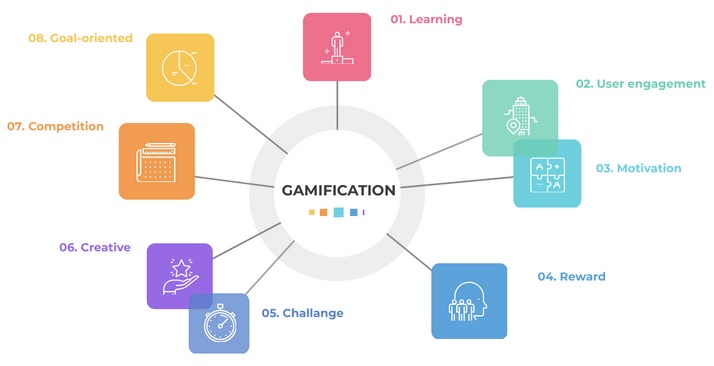6 Effective Strategies To Use Gamification For Fun Learning
5th March 2024

Technology inherently drives learning and the development of curriculum in our modern environment. Today's teachers are using more and more cutting-edge digital tools and ideas in their lessons to get better results from their students. One of these tactics, gamification for learning, is becoming more and more popular among educators worldwide. The use of gamified components has the potential to enhance student engagement and collaboration, leading to more effective learning outcomes.
What Is Gamification In Learning?
Incorporating gamification learning into instructional frameworks transforms education and increases student motivation and engagement. This creative method maximizes retention and academic success by enhancing the learning process and making it more engaging for students by utilizing gaming elements.

Source: educationaltechnology.net
Games are powerful tools for teaching since they contain a variety of components. They are designed to resolve issues, foster healthy competition among members, increase teamwork, and enhance communication skills. Playing games also encourage players' inventiveness, inspiration, and originality.
The following advantages can be attained in education by implementing gamified learning:
- Higher motivation levels of the learners
- Better knowledge retention
- Increased student engagement
- Instant reinforcement and feedback
- More enjoyable learning experience
Ways To Use Gamification In A Classroom To Foster Student Engagement
Here are 6 techniques you can use to keep your students engaged and entertained while learning:
1. Completion Or Achievement Badges
An achievement or completion badge gives young minds a boost of pride for their efforts; what better way to show learners that you see their successes than with a tangible reward? For instance, you could offer a weekly badge for completing assignments or videos, and have learners collect them all during the course for a more significant badge at the end.
Small victories can lead to big results in the virtual classroom, which is why virtual badges or badges for learners that can be printed at home have become such a hit among educators.
Hey, do you follow us on Social Media? We regularly share upgraded educational content, tips, feedback and more. Check us out by clicking the profiles here - Facebook / Twitter / LinkedIn / Pinterest / Instagram / YouTube
2. Trivia Games
It used to be necessary to give students a written test or to call them out in front of the class to challenge them to recall material covered in class. This kind of learning can be intimidating and even embarrassing to certain students. To counter this, developers of games have discovered a method for assessing students without placing them under duress.
Trivia not only assesses your students' comprehension of the material being covered in class, but you can also use the results to determine what still needs work. Introducing a trivia game to your students at the start of class can assist you in focusing your instruction on the areas that require more attention. However, playing a trivia game at the end of class could encourage students to participate more and ask more questions.
3. Storytelling
Books contain words, but stories are made of more than simply words. By using the voices of numerous people, stories provide students with an opportunity to learn about different cultures and viewpoints. When students write detailed, impactful stories, communication skills are strengthened.
Naturally, narrative need not necessarily come from a book. It may take the shape of a poetry, play, or even rap fight. Another excellent method for teaching with a diversity-focused mentality is through storytelling.
4. Scavenger Hunts
Little learners love scavenger hunts, but did you know that learners of all ages also like the hunt? They let students engage with one another as well as share their discoveries with other students. In addition, this kind of learning enables students to come up with original ideas, collaborate to support the success of their peers and solve problems when an item is unavailable.
However, scavenger hunts aren't just about tracking down tangible items around the house. A literary scavenger hunt can also be made with quotations, fictional characters, or scene-setting clues. Use longer word problems when teaching arithmetic to demonstrate how to ‘find’ the crucial information in each problem.
5. Hands-On Learning Activities
As your students work on a subject at home, you may assist them in comprehending it better by providing them with interactive learning games. Students can join part on projects like making slime, building a toothpick bridge with just the number taken out of a deck of cards, or drawing a monster with information taken out of a hat on paper.
Are you trying to find games for your virtual classroom? Think of using games like Guess Who? for character descriptions, Battleship for coordinate grids, or online strategy games for teamwork.
6. Escape Rooms
Escape rooms are renowned for their difficult puzzles, enigmas, and satisfying victories when you and your group beat the time. Using escape rooms in an online classroom fosters collaboration and teamwork.
Students must interact with one another, consider the issues, and come up with solutions as a group. Additionally, students can solve puzzles in escape rooms using the knowledge they have gained in class, which might give them an idea of how well they understand the subject.
Make Learning Fun With Gamification
It's time for you to give gaming a try now that you know how it can improve your students' in-class experience. Give any of the aforementioned suggestions a try in your virtual classroom. Additionally, consider pursuing Bachelor’s Degree Courses to understand the importance of implementing alternative learning methods constantly to boost the overall efficiency of the learning modules.
We believe education should be accessible for everyone. That’s why we don’t charge for our blogs. Find the right course that will help you in your career with us, contact us at - 1800–212–6400. You can mail us at act@asiancollegeofteachers.com.
Written By : Sanjana











